 |
| Selection ramp of Auschwitz I |
Deciding on attending this trip, I
knew the trip was going to be an insightful trip. The moments packing up for
the States jogged my memory of all the monuments, plaque and expanding my aboard
experience to two countries, both my colleagues and I concluded from our
travels that we will never forget what you see, I am know seeking out current
events closer in parallel to political and foreign issues today. Some events
from the 1940’s could be compared to the presidential election, after spending
time viewing the destruction and learning more about Hitler’s ideology could be
compared to present candidates of the 2016 election. Poland as taught me, in a
place of hatred their can be a revolution having the polish people unite and
rebuild what was destroyed. Supporting the fact history can and always repeats
itself. Father Manfred, who gave three lectures about his views on the idealism
of Nazism, where is god in Auschwitz and different perspectives on the
Auschwitz concerning Jews, the Polish and the Germans explained the religious
perspective on remembering the Shoah.
 |
| Auschwitz I memorial |
Father Manfred spoke on numerous
questions of ethics, where god was and where the population can move from this ideology.
Rudolf Huss was the backbone of Nazism. This was the case when in control of
Auschwitz I. He had a family living on the camp in a separate building behind
the gas chambers. Before arriving to Auschwitz he wanted to become a minister
while his father thought he would be a priest, he was non of these religious
leaders. In 1922 he became an anti-Christian from the raising power of Hitler.
Huss was fascinated by the ideology of mass killing groups of people, losing
the human respect toke action to control Auschwitz knowing Hitler wouldn’t
visit any concentration camps.
 In relation
to Father Manfred’s lectures we attended an interactive multi-learning
experience that allowed us to listen in on different questions on the Holocaust
and answers by scholars and religious personal. Three questions that I sought
where ethics based questions aligning with lectures. Victim a bystander or perpetrator?
I had multiple discussions in class and explanations from a survivor. Raul
Hilberg mentions the fact to all personal who helps prisoners escape or hide, Oscar
Schindler also become victims from the sacrifices of the war and pain from
their actions. What could be done to prevent any more Genocides from Holocaust?
In 1948 a treaty was passed by the United Nations supporting the need to end
all genocides, this defined what is a genocide so there is a clear definition.
According to this treaty, if a county has knowledge of a genocide occurring
they most inform the public and send personal to decrease the problem. Lastly,
why did Allies act of bombing Auschwitz? Yehuda Bauer replies that there was knowledge
of a camp but the allies had no idea of the destruction of Auschwitz it was
creating. In 1944 two prisoners escaped and reached the Slovakia border 14 days
later, after a week based the witnesses signed a report of their accounts of Auschwitz.
So until then any actions of bombing Auschwitz was not in their tactics of dismantling
Nazism. From listening to multiple explanations I now have a question, what is
ethics?
In relation
to Father Manfred’s lectures we attended an interactive multi-learning
experience that allowed us to listen in on different questions on the Holocaust
and answers by scholars and religious personal. Three questions that I sought
where ethics based questions aligning with lectures. Victim a bystander or perpetrator?
I had multiple discussions in class and explanations from a survivor. Raul
Hilberg mentions the fact to all personal who helps prisoners escape or hide, Oscar
Schindler also become victims from the sacrifices of the war and pain from
their actions. What could be done to prevent any more Genocides from Holocaust?
In 1948 a treaty was passed by the United Nations supporting the need to end
all genocides, this defined what is a genocide so there is a clear definition.
According to this treaty, if a county has knowledge of a genocide occurring
they most inform the public and send personal to decrease the problem. Lastly,
why did Allies act of bombing Auschwitz? Yehuda Bauer replies that there was knowledge
of a camp but the allies had no idea of the destruction of Auschwitz it was
creating. In 1944 two prisoners escaped and reached the Slovakia border 14 days
later, after a week based the witnesses signed a report of their accounts of Auschwitz.
So until then any actions of bombing Auschwitz was not in their tactics of dismantling
Nazism. From listening to multiple explanations I now have a question, what is
ethics?
With the questions answered and relating
this genocide to the present time Father Manfred concluded it best, “if you go
back to delete the past, what says things will change unless something is done
to change it” in parallel Jan Grabowski, a historian also believes we can’t
learn from human nature; “If humanity has learned from their mistakes, the
world today does not give a positive answer.”
Witnessing the good of Poland and
the worse has taught me to adapt to surroundings and have different
perspectives in mind, similar to a discussion of different perspectives
everyone has because of their identity.
-Elijah Ziobron























